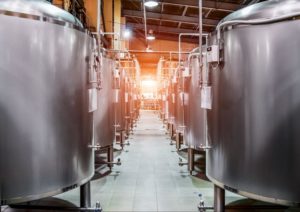This spring we’re exploring biotech’s biggest and greenwashiest claims in our series Are GMOs really going to save the world?
In our final piece of our three-part series, we examine the prospect of a global lab-based food system. Could synthetic biology be the key to producing food in a changing climate, or just a lot of hot air? Don't forget to check out Part One of the series, Genetically Engineered Golden Rice: Real Hope or Misplaced Hype? and Part Two, How Useful are GMOs on a Warming Planet?
Since the rise of industrial agriculture during the 20th century, our food system has been writing checks the earth can't cash. The biotech industry continues to develop new GMOs for human consumption, marketing some of them as must-haves for feeding a growing population on a warming planet. But, do biotech's promises hold when we examine them in detail?
New GMOs' performance in yield and adaptability is uncertain. Still, some downstream impacts are foreseeable: Patented GMOs will nearly certainly usher in a new era of privatization in the food supply, resource monopolies and even more industrialization.
What do you think — could the solution to industrialization in our food system be more industrialization?
We're skeptical, too.
Old MacDonald had a "ferm" 
Have you heard of "precision fermentation"? It's a genetic engineering technique popping up at trade shows and in the media. Precision fermentation is a marketing term for synthetic biology (or "synbio"), a process that generally uses genetically modified microorganisms to produce a variety of compounds for food or industrial use. Synbio vanillin, some scents or flavors, synthetic vitamins and specialty ingredients such as Impossible Burger's blood-like "heme" are produced using this technique.
According to activist and writer George Manbiot, synbio (aka precision fermentation) will save us all.
In 2020, Manbiot penned a controversial article for the Guardian proposing synthetic biology as the ideal production model for most human food. Farming, he wrote, must be replaced by "ferming," a system under which proteins, egg and dairy replacements would come from giant vats in labs and warehouses, and the remaining carbohydrate residue would be transformed into our favorite comfort foods. By adopting a lab-based food system, Manbiot argues we could rewild agricultural landscapes and curb environmental disaster.
Leaving aside for a moment what we imagine would be a tidal wave of unforeseen impacts and micronutrient deficiencies, is such a future even possible?
The first issue concerns practicality: Global "ferming" would involve a dizzying amount of new infrastructure. A lab-based food system takes production indoors, requiring immense amounts of energy. Even if we were to convert to green energy, completely replacing the natural and elegant process of photosynthesis and moving our food production indoors isn’t efficient.
There's also another kind of fuel to consider — the "food" needed to sustain those genetically modified microorganisms so they can churn out the compounds we'll later consume. Synbio frequently employs simple sugars such as sugar cane, genetically modified corn or genetically modified sugar beets. Growing enough food for our food brings back the industrial monocultures of GMO crops that "ferming" was meant to replace.
Finally, there's the issue of food system monopolization, which results in negative impacts for just about everyone who eats. Currently, just four agrichemical companies own more than 60% of the global seed supply and a handful of food manufacturers control the most popular grocery store products. Global "ferming" would likely increase our dependence on private ownership. A recent article in Forbes summed up the problem of precision fermentation and privatization: "What will be the implications for a single company to own the formula for milk, honey or eggs?" (The article's author Errol Schweizer serves on the Non-GMO Project Board of Directors). Keep in mind, market monopolies work wonderfully for the corporations who hold them, but "consumers, farmers, small food companies and the planet lose out if the top four firms control 40% or more of total sales."
Unsurprisingly, industrial systems tend to approach complex and interconnected problems with industrial-style solutions. However, extractive approaches badly distort the issues and root causes of serious problems, preventing meaningful and effective remedies. Additionally, the biotech industry's genetically engineered solutions — such as "precision fermentation" and other new GMOs — prioritize costly quick fixes over systemic changes and accelerate the privatization of the world's food supply.
Thankfully, the path forward needn't be so grim. There are authentic, agroecological solutions to our most grave problems, solutions that prioritize the welfare of people and the planet over shareholder profits. New pathways emerge by working holistically with the whole food system — and the people whose work drives it.
